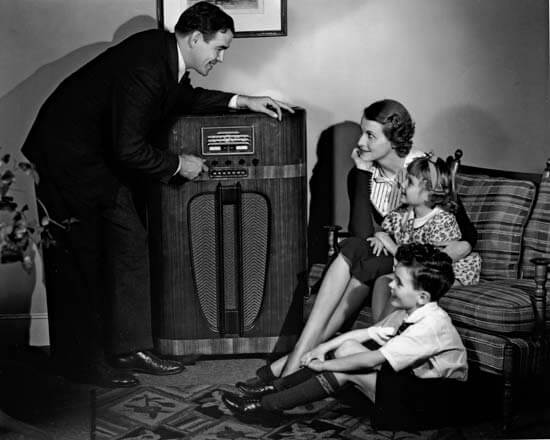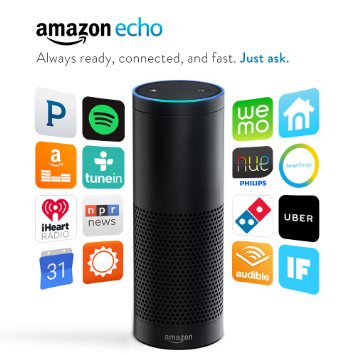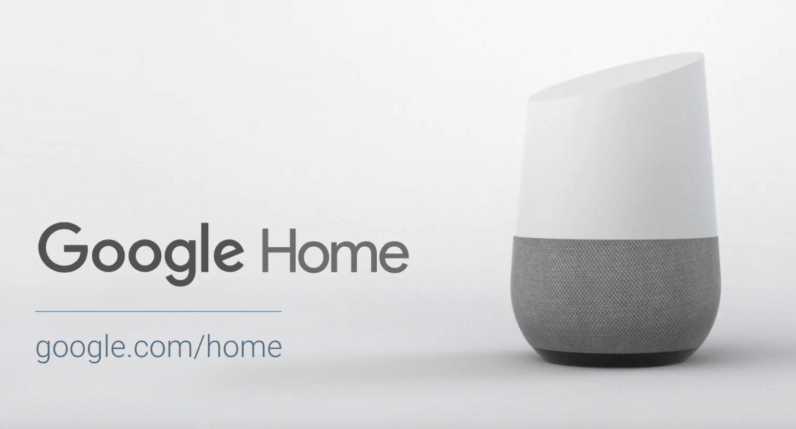Download our E-BOOK
Hub of the Home: The Next Internet of Things Battleground
June 6, 2016
by Ashley Rondeau
What is the hub of your home? Until now, the answer to that has been your main source of entertainment. Remember when it was this?

And then it was this:

Then in the 2000s, the major video game console systems were jockeying to be the entertainment hub of your home. The Wii, the Playstation, the Xbox could not only play games, but connect to the internet to stream media, and play HD-DVDs and Blu-ray disks to boot (remember those?).
Of course, we didn’t expect physical media to die such a quick death. Today, the landscape is, like everything else mobile, very fractured. How many of you have a Roku, Apple TV, Google Chromecast, Amazon Fire Stick, Boxee, or maybe just a TV that’s already internet enabled? How many even still have a TV? We know plenty of families who just stream TV and movies directly to iPads or laptops. Try as the big corporations might, no one product has won the entertainment hub wars.
But that might change if companies can win something more important: your home’s IoT controller.
Upcoming battleground: your home’s brain.
We’ve seen connected smart products slowly infiltrate our homes. Google’s Nest made a big splash a few years ago as a smart thermostat that could control more than just the temperature. Then Sonos made a push for smart audio in the home.

But Amazon’s Echo is what made the industry sit up. Finally, unlike Nest or Sonos, the Echo was the first foray into creating a functional, affordable, and connected brain for everything. Suddenly, if something in your home had the right wireless app, it could be controlled via voice command. Lights, heat, a/c, music, even locks. So heres’ the rub: the company that controls your home’s brain is poised to be the gatekeeper to every other product you purchase. After all, why would you buy wireless speakers that don’t work with your home’s hub?
That’s why the mobile juggernauts Google and Apple are scrambling to get their Echo competitors in the home. Google Home and Apple HomeKit (and their to-be-named Echo competitor) are launching so Amazon doesn’t win the day.
If you thought Nintendo vs Sony vs Microsoft was interesting, just wait until this new three-way tech hardware war heats up.
So, who’s going to win?
Well, Amazon has the lead. They’ve sold 3 million Echos already, with solid customer reviews, and they’ve released different versions that are cheaper and more portable. Google has yet to release their version, and Apple’s HomeKit is fairly limited in what it can actually do. Additionally, Amazon has experience with their “Internet of Things for the home” products. Their Dash buttons were some of the first IoT items anyone actually bought.
However, Google has Android and Apple has iOS. Since your home’s hub will rely on mobile apps, these two tech giants will have a huge edge over Amazon simply because they do mobile better. Amazon failed with its smartphone try, and its own app store has never been competitive. It’s unlikely Amazon can win if software ends up being the key to winning the home (and it will be).

Of the two, Google has the search edge over Apple. Sure, Siri works ok, but Google’s own voice search “Ok Google” has the power of, well, Google behind it. And Google’s search is still the best in the game. If you want to be able to ask the hub of your home a question, you probably want Google to answer. Especially since Android is much better than iOS at 3rd-party integration.
On the other hand, Apple has the hardware edge over Google with a proven track record of waiting a while and delivering exactly what the masses want. Apple has stumbled lately in delivering services, but they’re still the company to beat if we’re talking about a product that lives in the home that will be used every single day by mom and pop. As long as their apps equal what Android offers, their slicker hardware might be what tips the scale.
The real answer will probably look more like the console wars than you think: a little messy, but great for the consumers who will have three choices when it comes to what controls their home’s IoT. And especially great news for app developers who will be churning out the software to make everything actually work. So we say, bring on the future!
Who do you think will win the hub of the home battle?
Related Blog & Posts

How to Increase conversion in 2025
With over 25 years in technology and product development, Dan leads Rocket Farm Studios with a commitment to innovation and growth.
Ready to turn your app idea into a market leader? Partner with Rocket Farm Studios and start your journey from MVP to lasting impact.”
Teams for App Development
We help companies build their
mobile app faster with go to market strategy

Technology and UX Audits

Early Design Sprints

MVP Creation

App Store

Growth Teams
Download Our Free E-Book
Whether you’re launching a new venture or scaling an established product, Rocket Farm Studios is here to turn your vision into reality. Let’s create something extraordinary together. Contact us to learn how we can help you achieve your goals.







